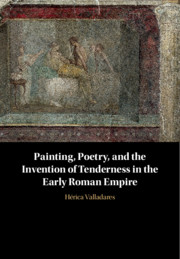Book contents
- Painting, Poetry, and the Invention of Tenderness in the Early Roman Empire
- Painting, Poetry, and the Invention of Tenderness in the Early Roman Empire
- Copyright page
- Dedication
- Contents
- List of Plates
- List of Figures
- List of Tables
- Acknowledgments
- Introduction On Roman Tenderness
- One The Tenderness of Lovers
- Two The Tenderness of Monsters
- Three The Tender Interior
- Epilogue Tenderness Transformed
- Notes
- Bibliography
- Index
Epilogue - Tenderness Transformed
Published online by Cambridge University Press: 26 November 2020
- Painting, Poetry, and the Invention of Tenderness in the Early Roman Empire
- Painting, Poetry, and the Invention of Tenderness in the Early Roman Empire
- Copyright page
- Dedication
- Contents
- List of Plates
- List of Figures
- List of Tables
- Acknowledgments
- Introduction On Roman Tenderness
- One The Tenderness of Lovers
- Two The Tenderness of Monsters
- Three The Tender Interior
- Epilogue Tenderness Transformed
- Notes
- Bibliography
- Index
Summary
This final section of the book analyzes how elegiac tenderness was absorbed into a conservative, mainstream discourse on conjugal love. By the late first century CE, the Augustan elegists’ witty and subversive ideal of a life of love became a commonly accepted model for articulating, describing, and commemorating the emotional bond between spouses. The elegists’ ironic use of familial, marital, and domestic terminology to portray the poets’ ardent and illicit love affairs is now itself domesticated and deradicalized. In elite discourse, Pliny the Younger’s letters to his wife, Calpurnia, are an excellent example of the appropriation of the language of elegiac tenderness in the context of a traditional Roman marriage. But as with other aspects of the Roman aesthetic of tenderness, this form of conjugal self-fashioning was not an exclusively elite phenomenon. Both the Pompeian portrait of “Terentius Neo” with his wife and the Roman altar dedicated to Pedana by her husband Donatus demonstrate how a wide spectrum of Roman citizens adopted elegiac models for their own self-representation.
- Type
- Chapter
- Information
- Publisher: Cambridge University PressPrint publication year: 2020



